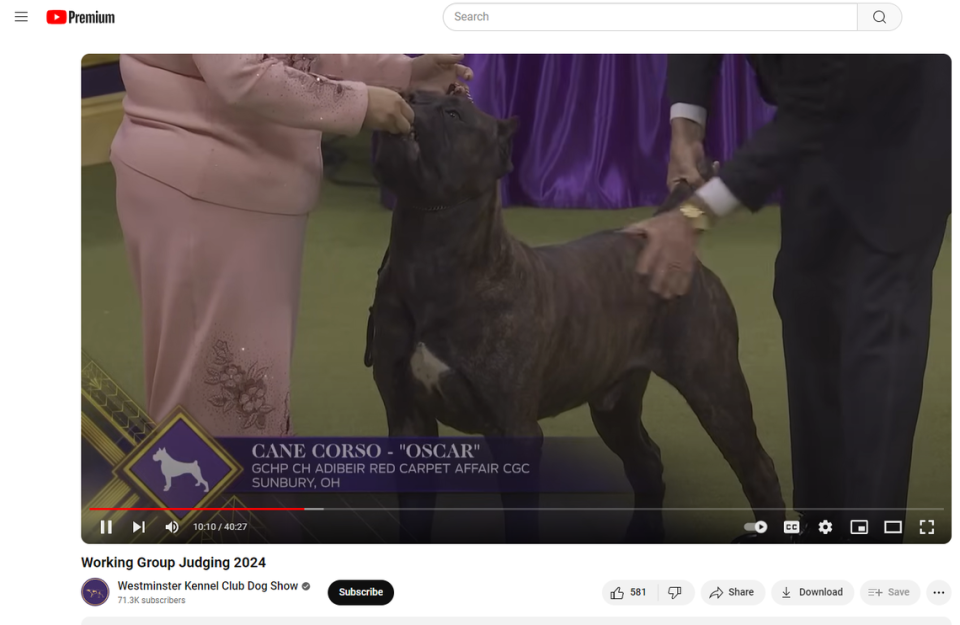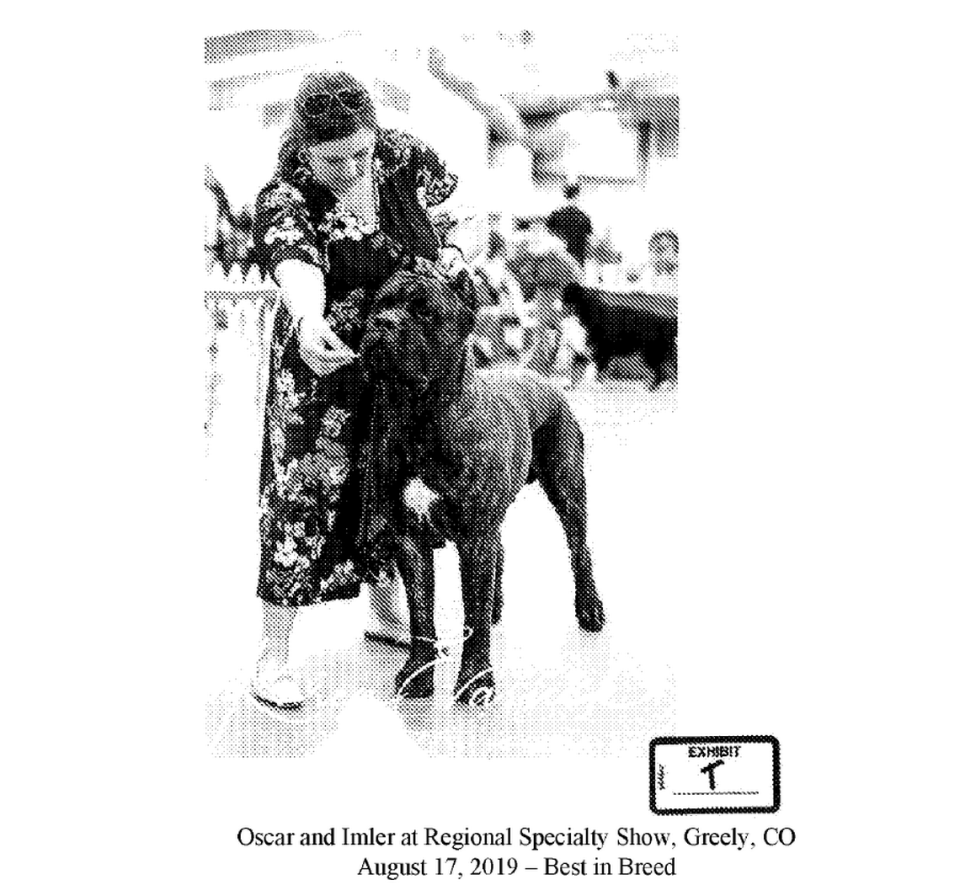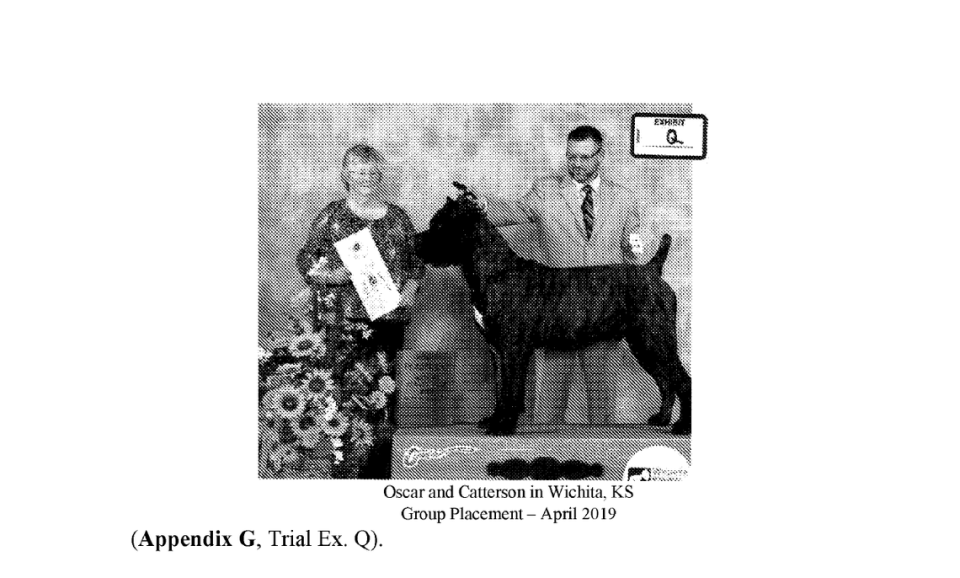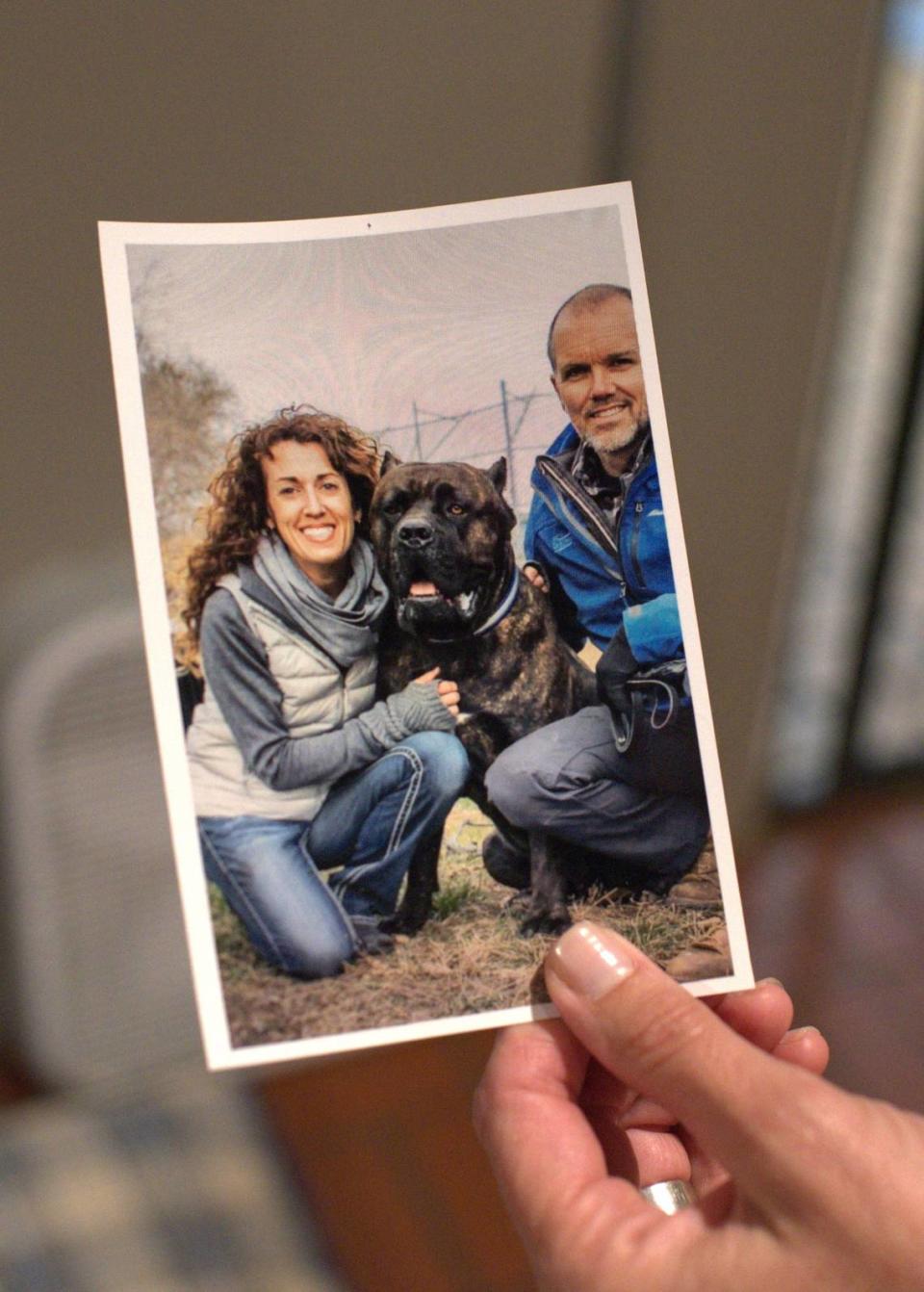A yearslong fight over prized KCK show dog went to Kansas Supreme Court. It’s not over yet
As the crowd cheered, Emily McLeod and Dave Jennings watched with mixed feelings while Oscar, a nationally-recognized Cane Corso, trotted through the ring of the prestigious Westminster Kennel Club dog show in New York.
The mid-May trip marked the first major show the Kansas City, Kansas, couple attended in some time. It was also a rare chance to see the dog they consider a missing part of their family.
“It was wonderful to see him. And it was excruciating to see him,” McLeod, a professional animal chiropractor, told The Star during a recent interview. “Because we couldn’t pet him. We couldn’t interact with him.”
“And the handler and the person listed as his co-owner now lived very much by the letter of the district court decision,” added Jennings, her husband, saying nowadays the only proof of life they get arrives in purebred dog publications or letters penned by lawyers.
Since puppyhood, and before reaching show-dog celebrity status, Oscar lived alongside Jennings and McLeod’s other pet dogs, cats and pigs. And since 2019, they’ve fought to get him back through a long and bitter court battle with his breeder and legal owner.
A unique case with little guidance in the way of precedent, the fight over Oscar has drawn attention from outside observers in the dog show world and those versed in the developing field of animal law. Like many states, pet ownership in Kansas is decided with essentially the same regard as any other personal property.
In November, the case reached the Kansas Supreme Court. On May 3, the state’s highest court issued an opinion that returned further proceedings over Oscar’s ownership to Wyandotte County.
It essentially put everyone back to “square one,” Jennings said.
“The sheer amount of money that we have spent on legal fees and bills and paperwork and transcripts and all the things. And to know that, twice now, both courts said the judge did the wrong thing,” Jennings said.
“But there’s no repercussions. We are still out.”
How much have they spent on Oscar’s case?
“I could have bought a new truck,” Jennings said with a laugh. “I’ll just say that.”
“Could’ve paid for med school,” added McLeod.
On the other end of the dispute is Elizabeth “Betsy” Shauck, a railroad engineer with decades of experience in breeding competitive dogs. Her aspirations of making Oscar a top prize-winner at Westminster frayed her relationship with McLeod and Jennings, whom she once considered close friends.
Through her lawyers, Shauck declined an interview with The Star. But attorney Matthew Brooker released a statement saying they “strongly disagree with many of the allegations and public comments” made by Jennings and McLeod.
“Betsy loves Oscar very much, cherishes her personal relationship with him, and has many fond memories of raising him with her late husband Toby before he lost his battle with cancer,” Brooker said, adding: “Oscar is healthy, happy, and continues to thrive both inside and outside the show ring.”
Brooker said Shauck will retain “the right to make decisions about Oscar so that she may ensure he is properly cared for as he continues to be an amazing representation of and ambassador for his breed.”

Prize pup
In May 2017, Oscar was born in a litter of 10 purebred puppies. Shauck, who became friends with McLeod through McLeod’s chiropractic practice, soon asked her to consider taking Oscar in.
At the time, Shauck’s husband was terminally ill. And his worsening health limited her ability to keep up with breeding show dogs.
Jennings and McLeod welcomed Oscar into their home. They say it was understood from the beginning that Oscar would be theirs — a key point debated by lawyers and weighed by judges since.
Another critical point that has played out in court: A verbal agreement that Oscar would not be neutered, a disqualifying condition in the competitive dog arena, and the terms of his participation in dog shows.
In 2018, McLeod and Jennings purchased a new home in southwestern KCK with Oscar and their other animals in mind. The sprawling property, formerly the site of a Wyandotte County juvenile detention facility, was repurposed as an outdoor playpen for their pets.
For a brief time, after the death of her husband and during the tail end of their friendship, Shauck lived in an adjoining apartment at Jennings and McLeod’s home.
“We took meals to her sick husband. We visited them in the hospital. We were the only two people that were not immediate family that were able to come say goodbye to (her husband) Toby. We were such good friends,” said McLeod, recalling the close relationship they once had.
When Shauck sold other dogs she bred, she drew up receipts and contracts to document the transactions. But because they were friends, McLeod and Jennings said they did not think they needed one for Oscar.
Their view changed after the friendship soured in the months that followed.
Tensions rose when Oscar was diagnosed with a severe infection in his right testicle. A veterinarian suggested neutering him would be the best course of action. A second opinion resulted in a medical prescription that effectively treated his condition without the surgery.
After he recovered, Oscar began earning higher and higher accolades in the dog show ring during the spring of 2019. At one point Oscar was considered among the top five Cane Corsos in the country, putting him on track for an invitation to Westminster, the nation’s most famous dog show carried on live television each year.
Behind the scenes was a brewing disagreement over Oscar’s future. Jennings and McLeod wanted him home; Shauck wanted him on the road.
That August, Oscar won a Best in Breed title during a show in Greeley, Colorado. Jennings and McLeod expected Oscar would return home afterward — and grew anxious when he did not.

They learned that Shauck arranged for Oscar to live in Maryland with a professional handler so he could more readily participate in East Coast dog shows. The revelation, as Jennings and McLeod describe it, amounted to an early example of “promises broken.”
After a heated phone call and a series of text messages, which were later entered as evidence in the civil court case, McLeod asked Shauck whether they would ever see Oscar again.
Shauck accused Jennings and McLeod of working underhandedly to have Oscar neutered and end his show career — a point they deny. In a text, McLeod noted she had identified Oscar’s infection months earlier, preventing him from being neutered, or “left intact” in dog-show parlance.
“You didn’t save his testicles. I did,” Shauck responded, before referencing advice from her lawyer that Jennings and McLeod should not have possession of Oscar.
“It’s time for him to start his show career for real. He will stay with his handler, hired by me, and receive the care and training he deserves. You will always know where he is. I want you to be part of it. I won’t exclude you unless you give me no other choice.”
Oscar was gone for about six weeks. Jennings and McLeod described it as a time of serious distress and uncertainty.
Then in September 2019, Jennings drove to Hampton, Virginia, where Oscar was scheduled to compete.
With the help of a friend, Jennings walked in, took Oscar and drove back across the county. The police were called when Oscar’s assigned canine handler noticed the show dog had disappeared mid-competition, a factor that did not play well for Jennings and McLeod when the case first went to court.
Oscar remained with Jennings and McLeod during the initial wave of the COVID-19 pandemic as dog shows were shutting down along with everything else around the country. McLeod said friends advised she get Oscar neutered immediately — but they decided not to because they had made a promise to Shauck.
“Dave (Jennings) went to Virginia and picked him up at a dog show. But that isn’t where things went sideways,” McLeod said. “Where things went sideways was the fact that (Oscar) never returned from Greeley, Colorado.
That was the first promise broken and we’re not the ones that broke it.”
Lawsuit, appeals
After Oscar returned to KCK, Jennings and McLeod filed a civil action seeking a property title to him. Shauck sought competing court orders to prevent the couple from neutering him, ensure the return of Oscar to her care and declare that Oscar was in fact hers.
The case was handled in Wyandotte County District Court, as lengthy delays reached new heights prompted by the pandemic. Over the course of mid-October and November 2020, three hearings were held before Judge William P. Mahoney over Zoom teleconference.
A dozen witnesses were called. Among those who testified were professional dog handlers, breeders and a judge for the American Kennel Club.
Items introduced as evidence — from both sides — included photographs of Oscar participating in dog shows and a registration with the national dog club that previously listed McLeod and Jennings as owners.

In November 2020, Mahoney issued a written order declaring Shauck as Oscar’s sole and rightful owner. In the absence of a written contract, Mahoney found Shauck’s testimony about the arrangement and ownership of Oscar most credible.
The judge also criticized the means by which Jennings and McLeod took Oscar back, saying they “overstepped their authority” when they “snatched Oscar” from the Virginia dog show. Mahoney said that was “not the action of someone who thinks they are in the right.”
Two years later, the Kansas Court of Appeals found that the Wyandotte County judge had overstepped his authority.
In a decision based on procedural technicality, the appellate court found that Wyandotte County District Court did not properly notify Jennings and McLeod that ownership would be answered by the judge in his court order. Instead, the couple were expecting a legal ruling on a separate matter, according to their lawyers.
It amounted to a violation of due process, the appellate court found. Further, the court determined there was evidence to support that Jennings and McLeod had a valid ownership interest in Oscar, referring to them as co-owners with Shauck.
Last month, the Kansas Supreme Court identified another instance of overstepped authority.
The state’s highest court determined the appellate court jumped the gun in assigning co-ownership to Jennings and McLeod, saying that was still a matter for the Wyandotte County District Court to decide.
Justice Evelyn Z. Wilson wrote in the May 3 opinion that the procedural history of the case “precludes us from reaching the heart of the matter.”
“And while the panel (Kansas Court of Appeals) claimed that its role was ‘not to substitute our judgment for that of the district court,’ it seems to have done just that,” Wilson wrote.
‘Until Oscar is home’
In her legal practice, Katie Bray Barnett says she most often sees ownership disputes arise from domestic situations, such as a couple that owned a dog together breaking up. And those cases frequently move through small claims court — as Kansas law governing pet ownership is the same as other property such as a chair, a car or a stove.
“That’s what makes these cases so incredibly hard. They’re unique, because they’re living beings, and they’re part of our family. And people feel such a connection with their pet,” said Barnett, whose Topeka-based firm specializes in animal law.
The absence of a clear statute — or much relevant case law — challenges the courts in situations when two people claim the same pet. All sorts of evidence can be entered to make an argument for rightful ownership, including demonstration of extended possession or receipts for veterinary care.
Oftentimes, Barnett says, courts offer money as compensation to a person whose pet is claimed by someone else because judges recognize their own orders are highly difficult to enforce across county or state lines.
“We don’t have anything really in Kansas. Which is how you get to where Dave and Emily are right now. Judges are just like, ‘This is different. I didn’t get any training on this. And I don’t see many of these cases.’ And so they don’t know how to handle them when they come forward,” Barnett said.
Many people make concessions or give up entirely because they do not have the time, dedication or financial resources to keep going. A case like Jennings and McLeod’s is highly unusual.
“Rarely are these decisions published. Even rarer are they appealed. And so that’s what makes this case so very unique for Kansas. Because you won’t see a case like this at an appellate level,” Barnett said.
For McLeod and Jennings, one of the reasons they say they’ve publicized their story is to shed light on and advocate for laws that might better protect pet owners. They started The Oscar Project, a social cause with its own Facebook page, pins and bumper stickers.

Pictures of Oscar still hang on their walls, including a large portrait above their dining table. His bed is still waiting for him.
And as the court case has languished, McLeod and Jennings say they’ve lost something they’ll never get back: time. Oscar turned 7 years old May 21, McLeod noted, saying the average lifespan of Cane Corsos is around 10 to 12 years.
“We have lost three and a half years with him, which is important to us. But the court doesn’t consider it at all, because he’s just property. And that’s a shame,” McLeod said.
“It’s almost like the movie. Like the movie ‘Best in Show.’” said Jennings, referencing Christopher Guest’s mockumentary film made in 2000. “We could probably have a movie made of this. … If it wasn’t happening to me, I’d think it was laughable.”
Jennings and McLeod say what happens next is anyone’s guess. But they intend to keep fighting “until Oscar is home.”


